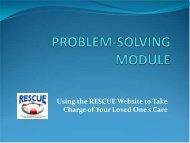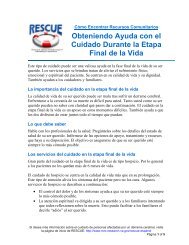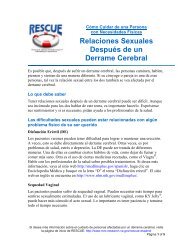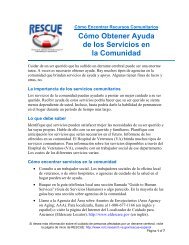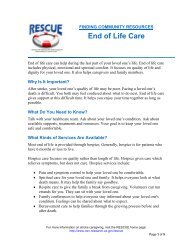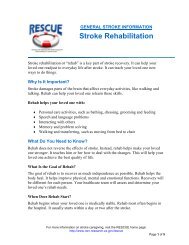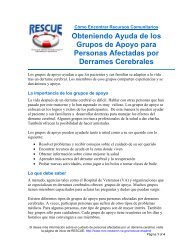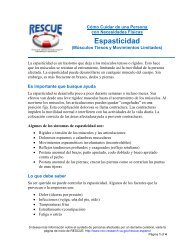Feeling Tired After Stroke (Fatigue) - Rehabilitation Outcomes ...
Feeling Tired After Stroke (Fatigue) - Rehabilitation Outcomes ...
Feeling Tired After Stroke (Fatigue) - Rehabilitation Outcomes ...
Create successful ePaper yourself
Turn your PDF publications into a flip-book with our unique Google optimized e-Paper software.
CARING FOR SOMEONE WITH<br />
PHYSICAL NEEDS<br />
<strong>Feeling</strong> <strong>Tired</strong> <strong>After</strong> <strong>Stroke</strong><br />
(<strong>Fatigue</strong>)<br />
<strong>Fatigue</strong> is defined as loss of energy or strength. Around 30-70% of stroke survivors<br />
feel very tired or have fatigue.<br />
What Do You Need to Know<br />
It is normal for your loved one to tire easily. <strong>After</strong> a stroke, simple tasks, like sitting<br />
up or standing, may be exhausting. With time, your loved one should get back<br />
strength and energy.<br />
Health issues that decrease energy after a stroke include:<br />
Muscle weakness<br />
Paralysis<br />
Pain<br />
Poor nutrition and weight loss<br />
Sadness or depression<br />
Why Is It Important to Get Help<br />
<strong>Fatigue</strong> can slow down your loved one’s recovery. It is important for your healthcare<br />
team to learn the cause of fatigue. Sometimes fatigue is due to medical problems that<br />
can be treated. At other times, fatigue is due to side effects of medicines. The good<br />
news is there are treatments and ways to decrease fatigue.<br />
What Treatments Should You Discuss with Your Healthcare<br />
Team<br />
Medicines often help if fatigue is due to pain or depression.<br />
A social worker, psychologist, or psychiatrist can help your loved one with<br />
depression.<br />
A physical therapist (PT) can teach exercises to build strength. A PT can<br />
show your loved one how to move and save energy.<br />
An occupational therapist (OT) can teach new ways to do everyday tasks to<br />
save energy. An OT can suggest changes to make in your home to help your<br />
loved one move around.<br />
For more information on stroke caregiving, visit the RESCUE home page:<br />
http://www.rorc.research.va.gov/rescue<br />
Page 1 of 3
Helpful Tips<br />
Encourage your loved one to eat healthy foods like fruits and vegetables.<br />
Give your loved one plenty of water to drink. Decreased amounts of liquids<br />
can cause fatigue.<br />
Plan frequent rest periods.<br />
Help your loved one get a good night’s sleep. Limit caffeine after lunch. Get<br />
up and go to bed at the same time each day.<br />
Help your loved one stay active. Too much bed rest can weaken muscles.<br />
Work with your healthcare team to develop an exercise plan.<br />
Remember<br />
<strong>Fatigue</strong> is a common problem after stroke.<br />
Talk with your healthcare team about your loved one’s fatigue.<br />
Frequent rest periods are important.<br />
Help your loved one exercise and stay active.<br />
More Resources<br />
The following resources contain internet links. The location of internet pages can<br />
change. Therefore the links provided may not always work. For the most current<br />
version of this list, go to http://www.rorc.research.va.gov/rescue/resources. This<br />
page will be updated frequently.<br />
Link Disclaimer: Links to information and Web sites outside of the Department of<br />
Veterans Affairs do not indicate an endorsement of products or services offered by<br />
the sites. In addition, these sites may have privacy and security policies that are<br />
inconsistent with those of VA.<br />
American <strong>Stroke</strong> Association<br />
Web: http://www.strokeassociation.org<br />
Phone: 1-888-478-7653<br />
The American <strong>Stroke</strong> Association has information about stroke-related physical<br />
problems. They have a fact sheet called “Let’s Talk About <strong>Feeling</strong> <strong>Tired</strong> <strong>After</strong><br />
Stoke.” Go to this link:<br />
http://www.strokeassociation.org/presenter.jhtmlidentifier=3018610<br />
For more information on stroke caregiving, visit the RESCUE home page:<br />
http://www.rorc.research.va.gov/rescue<br />
Page 2 of 3
My HealtheVet (MHV)<br />
Web: http://www.myhealth.va.gov<br />
My HealtheVet (MHV) provides trusted information on stroke and other health<br />
conditions. It also provides resources for stroke caregivers and tools to track your<br />
loved one’s health.<br />
Also visit the Caregiver Assistance Center on the My HealtheVet Web site. This<br />
section provides more information on caregiving.<br />
• Go to: http://www.myhealth.va.gov<br />
• Click on the button that says “Enter Here”<br />
• Click on “Research Health” on the top bar, then “Healthy Living Centers”<br />
• Click on “Caregiver Assistance”<br />
National <strong>Stroke</strong> Association<br />
Web: http://www.stroke.org<br />
Phone: 1-800-787-6537<br />
The National <strong>Stroke</strong> Association has helpful information on recovery after stroke.<br />
They have information on “Recovery <strong>After</strong> <strong>Stroke</strong>: Managing <strong>Fatigue</strong>.” Go to this<br />
link: http://www.stroke.org/site/DocServer/NSAFactSheet_<strong>Fatigue</strong>.pdfdocID=991<br />
References: National <strong>Stroke</strong> Association. (2006). <strong>Stroke</strong> Facts; Managing <strong>Fatigue</strong>. Retrieved June 10, 2008,<br />
from: http://www.stroke.org/site/DocServer/NSAFactSheet_<strong>Fatigue</strong>.pdfdocID=991; American <strong>Stroke</strong><br />
Association. (2008). Let’s Talk About <strong>Feeling</strong> <strong>Tired</strong> <strong>After</strong> <strong>Stroke</strong>. Retrieved September 15, 2008, from:<br />
http://www.strokeassociation.org/downloadable/stroke/1219774148960<strong>Feeling</strong>%20<strong>Tired</strong>%20<strong>After</strong>%20a%20S<br />
troke.pdf.<br />
These materials were created for the project:<br />
Web-Based Informational Materials for<br />
Caregivers of Veterans Post-<strong>Stroke</strong><br />
Project Number SDP 06-327 funded by VA HSR&D<br />
Quality Enhancement Research Initiative (QUERI)<br />
For more information on stroke caregiving, visit the RESCUE home page:<br />
http://www.rorc.research.va.gov/rescue<br />
Page 3 of 3



